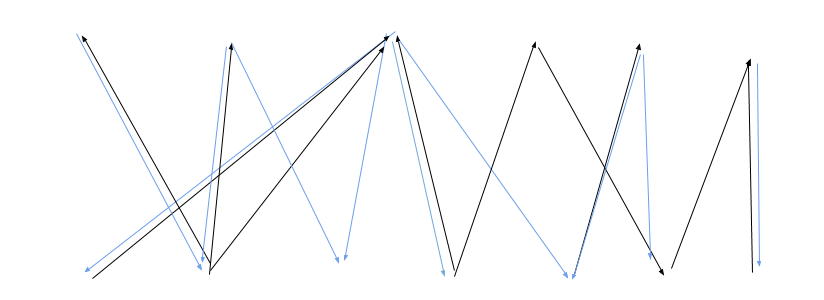There are two fallacies in your argument which both bear pointing out separately, though I think the other answers here already answer the overall question adequately.
A common observation in translation is that the source language tends to be more succinct, irrespective of which language you are translating from or to. The translator simply has a harder job than the original author, because they have to attempt to preserve the original author's intent, while at the same time adapting it to the cultural framework of a new audience and the structures of a different language.
This is routine, to the point where many localization agencies will allocate 120% of the source language's area to a text box in a layout which is going to be translated. (The factor will need adjustment up or down depending on circumstances; for example, if the target languages are all like Chinese where the orthography will typically make the translation fill up a smaller area more densely than alphabetic writing, it makes sense to go negative, assuming obviously that we are talking about translation from a language with alphabetic orthography here.)
The fallacy is the supposition that the source language is more succinct, or more precise, or richer.
On one hand, your data may be dominated by translations from English. On the other, it's not hard to find individual examples of sentences which are very succinct in some language, and cannot be expressed shortly and elegantly in English.
On the vocabulary level, for example, some languages contrast the inner vs the outer corner of something and can't say "inner or outer corner" in one word; they are not "better" or "worse" than English, just different, and you can often find examples where the opposite holds ("sky" vs "heaven" is just "cielo" in Spanish; "roof" vs "ceiling" is just "tak" in Swedish). Which is more succinct depends on what you happen to want to talk about. If you want to highlight the contrast, and your language allows you to do that easily, good for you; conversely, if you want to ignore it, you have to use a longer phrase, or live with some ambiguity.
Structural differences can be much harder to cope with for a translator. In Russian, your choice of verb indicates whether an action was successfully completed or not. Languages with gender can use it to convey undertones which aren't possible in English, which doesn't mark gender for nouns or verbs. Languages which don't have gender in their pronouns can say "his or hers" with a single word, or intentionally fail to reveal the gender of a person as a convenience or as a plot device.
What is objectively and measurably true is that English has a large vocabulary, measured in number of entries in dictionaries of the language. But what does that mean? As the linked article explains, that's only one way of counting among many.
The "many Eskimo words for snow" parable aptly illustrates the second fallacy (even though you should be skeptical of this anecdote as well 1). A particular concept may be more succinctly expressed or have a finer granularity in one language's vocabulary than another. The fallacy is generalizing to "all concepts" or "all important concepts" or "all culturally significant concepts" etc, when there are many reasons why vocabularies have gaps, including pure chance and cultural conventions.
(In my language, we have a word in my dialect for "being forced to" which isn't part of the main dialects in my country. Many people know this, and many people agree that this is an inconvenient gap, but still, you can't just convince people to adopt this, even though they would find it convenient on a personal level, and the dialectal word is completely transparent to speakers of those other dialects because it's just an inflection which is just not used by their convention.)
So in conclusion, it is possible that English is more succinct or more "descriptive" than many languages in some particular register or domain, but generalizing to the most descriptive language in all domains appears to be an obvious over-generalization.
These arguments by themselves do not prove you wrong; but as they say, extraordinary claims require extraordinary proof. I have pointed out some problem areas where at the very least you would have to collect a substantial amount of proof and counter-arguments to really support your hypothesis.
I should add that early linguists 2 had an embarrassing tendency to postulate superiority of their own language, in what now, with modern eyes, can only be characterized as an inexcusable naïvety about cultural bias and perhaps even xenophobia. Any claim that your language in particular is somehow remarkable should be examined with the utmost prejudice.
1 https://en.wikipedia.org/wiki/Eskimo_words_for_snow -- I was mainly referring to Pullum's seminal article when I looked this up, but there's more in the Wikipedia article so I'm linking there for context, though not necessarily as an authoritative or credible academic source.
2 I should say "early Western modern linguistics" at the very least but I recall scholars in antiquity who had the same bias, in spades; it's of course still possible that this is a purely European problem, and not a feature of human nature (and I shall be duly embarrassed, but unsurprised, if it should turn out to be so that I myself am unaware of my biases here).
